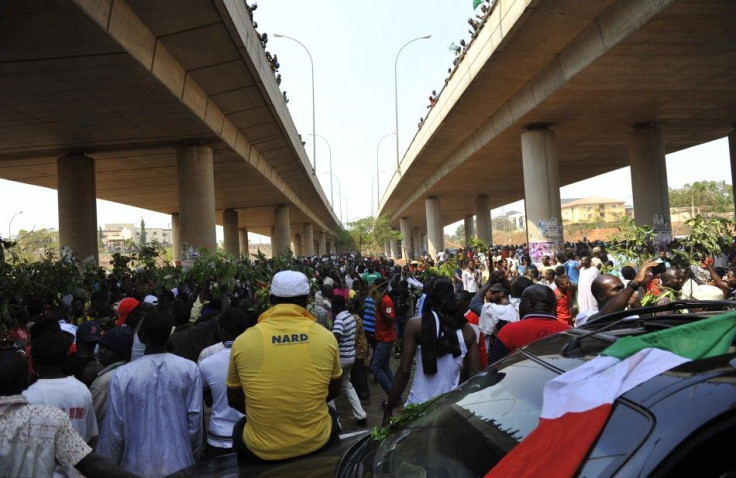Nigerian Unions Call Temporary Halt to Strikes Over Fuel Subsidy

Trade unions in Nigeria have temporarily halted a nationwide strike in order to negotiate with government officials over the removal of a fuel subsidy.
The labor movement and its civil society allies after nationwide consultations has decided that Saturday and Sunday will be observed as strike, protest and rally-free days, said a joint statement from Nigeria's main labor unions.
We ask Nigerians to utilize these days to rest, re-stock and get re-energized for the continuation of the strikes, rallies and protest from Monday.
The work stoppage, which commenced five days ago, had been called to protest the government’s lifting of a fuel subsidy which has dramatically raised the price of fuel and transport fares and prompted fears of an economic calamity in the oil-rich country.
Nigerian finance minister Ngozi Okonjo-Iweala said his government had put an offer on the table, which unions are now mulling over.
Already, a number of protesters have been killed in clashes with the police.
Lamido Sanusi, governor of the Central Bank of Nigeria, has warned the strike is costing the nation’s economy $600-million every day.
Moreover, if unions and the government cannot arrive at an amicable compromise, strikes will resume on Monday, further crippling an already chaotic nation.
We are going to come out on Monday very strong. It is going to be the mother of all crowds, said Nigeria Labor Congress head Abdulwahed Omar, according to Agence France Presse.
Reportedly, Nigeria petroleum industry (which accounts for 80 percent of the economy) has not yet cut production in honor of the strike. Given the high price of crude oil (amidst fears of reduced Iranian exports), they have little reason to. However, the head of the principal oil workers union in Nigeria has threatened to shut down production on Sunday if the government did not reinstate the popular fuel subsidy.
A Nigerian businessman told Reuters: Nigerians are not happy with what is happening. We will walk all the way from Lagos to Abuja to fight the government. Listen to the people when you negotiate.”
A civil servant in the city of Kano told the news agency: If the government will be sincere with what it pays to subsidize fuel, the labor and government should agree on a common front. My wish is that any decision should not hurt Nigerians, the economy or this great nation.
Richard Hamilton, a BBC correspondent in Nigeria, commented that the country’s president Goodluck Jonathan is also contending with a deadly outbreak of sectarian violence, fuelled by a spate of attacks by Boko Haram, an Islamic fundamentalist group which had targeted government figures and now, Christians. Although, ironically, the suspension of the fuel subsidy appears to have united Muslim and Christian people to some degree.
“The government has been unable to solve the deep historical rifts between the mainly Muslim north and the Christian-dominated south:” Hamilton wrote.
“But it seems to have unintentionally brought people together in their anger about the removal of the fuel subsidy -- an unexpectedly positive consequence. Over the last few days in Kaduna - normally one of the most volatile regions - thousands of Muslims and Christians came together wearing T-shirts and holding placards with slogans such as ‘Stop Fighting’ and ‘Nigerians Unite.’”
Hamilton added: “When Muslims prayed, Christians formed a human chain to protect them and vice versa. Hundreds acted out a similar scene in the northern city of Kano on Monday and two days later in the capital, Abuja. On Friday, a special prayer session is being held in Lagos with Christians and Muslims coming together. Of course Nigeria's deep-seated divisions are not going to disappear forever, but for now at least Nigerians appear to be speaking with one voice and forging unusually strong bonds.”
© Copyright IBTimes 2025. All rights reserved.





















